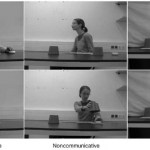Pedagogy
It's mid-August, and the school year is nigh. On Dynamics of Cats, Steinn Sigurðsson provides a blueprint for a successful academic term, and yes, you should take notes. Steinn writes, "Ideally, the primary teaching delivery would be a wise person at the end of a log [...] unfortunately wise people are in desperately short supply." More often the wise person is on the floor of a crowded auditorium. But Steinn believes the lecture is a strong foundation for learning—as long as students build on it "after class, over coffee, on the library steps, over lunch, drinking beer and during the…
Human infants have one important job during the first years of life, and that is to learn about the world and their culture from their parents and other caregivers. But what is learning? I've previously written that Hungarian developmental psychologists Gergely and Csibra have defined learning as the acquisition of new, generalizable knowledge that can later be used within a new context. Further, they have posited that evolution has prepared humans to learn generalizable knowledge from their caregivers. They proposed an elegant hypothesis: that a specialized innate pedagogy mechanism - called…
What is learning?
Most psychologists (indeed, most people in general) would agree that learning is the acquisition of new knowledge, or new behaviors, or new skills. Hungarian psychologists Gergely and Csibra offer a deceptively simple description: "Learning involves acquiring new information and using it later when necessary." What this means is that learning requires the generalization of information to new situations - new people, objects, locations, or events. The problem is that any particular piece of information that a human or animal receives is situated within a particular context…
There's a very well-known experiment in developmental psychology called the "A-not-B task." The experiment goes something like this: you, the experimenter, are seated opposite a human infant. Within the reach of both you and the child are two boxes: box "A," and box "B." You hide a toy in "A," in full view of the infant. As expected, the infant reaches for "A" to retrieve the toy. You repeat the process several times. Each time you hide the toy in "A," and each time the infant reaches for "A" to find the toy. Experimental set-ups like this are extremely common in infant and animal studies.…
At Uncertain Principles, Chad opines that "research methods" look different on the science-y side of campus than they do for his colleagues in the humanities and social sciences:
When the college revised the general education requirements a few years ago, one of the new courses created had as one of its key goals to teach students the difference between primary and secondary sources. Which, again, left me feeling like it didn't really fit our program-- as far as I'm concerned, the "primary source" in physics is the universe. If you did the experiment yourself, then your data constitute a…
tags: psychology, behavior, pedagogy, education, learning, teaching methods, model/rival technique, Avian Learning EXperiment, Avian Language EXperiment, ALEX, researchblogging.org,peer-reviewed research, journal club
ALEX the African Grey Parrot and Dr Irene Pepperberg.
Image: The ALEX Foundation.
Like anyone who has taught science courses, and probably like anyone who has ever taught anything to a classroom in the history of mankind, I've wondered how to motivate my students to really care about the material they are learning, beyond simply "studying for the test." For example, I have…
Since finals are nearly upon us here (and since I'm not quite ready to face the next stack of papers that needs grading), I got to wondering how other academics feel about when the final exam ought to be written and why.
So, a quick poll:
When do you finish writing your final exam?online survey
A relevant question, I suppose, is whether what you think is the best time to write the exam from a pedagogical standpoint corresponds to when you actually get it written (owing to your other responsibilities, the unidirectional flow of time, and so forth). Lurking in here are also some worries…


